7+ Sample Landlord Inspection Checklist
-
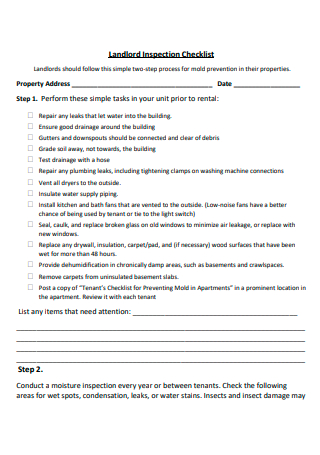
Landlord Inspection Checklist Template
download now -
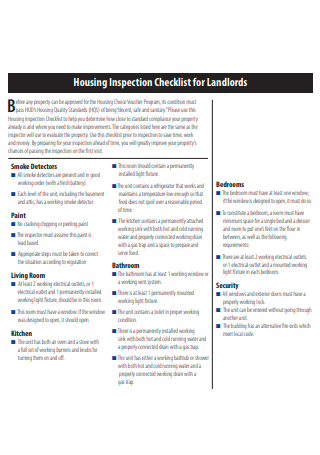
Landlord Housing Inspection Checklist
download now -
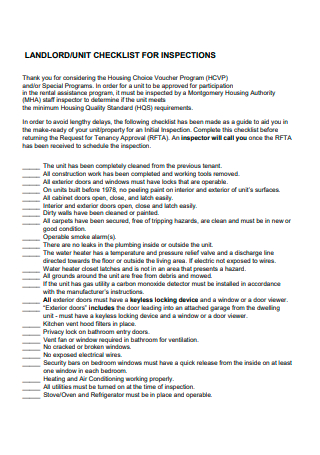
Landlord Inspection Unit Checklist
download now -
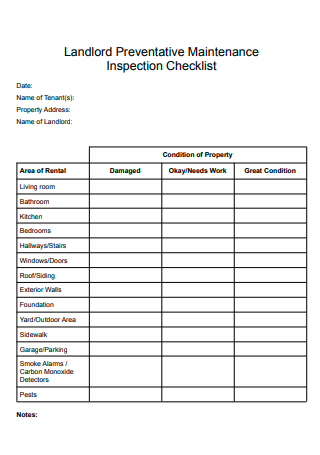
Landlord Preventative Maintenance Inspection Checklist
download now -
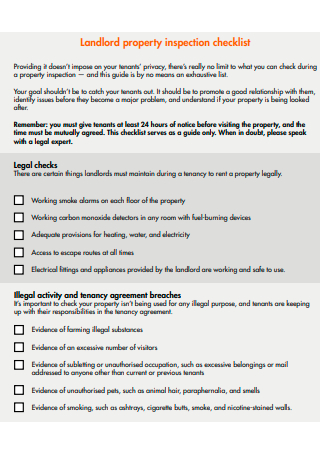
Landlord Property Inspection Checklist
download now -
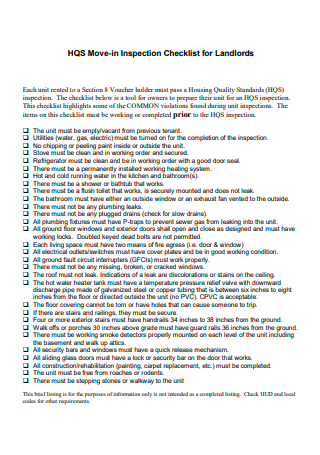
Landlord Move In Inspection Checklist
download now -
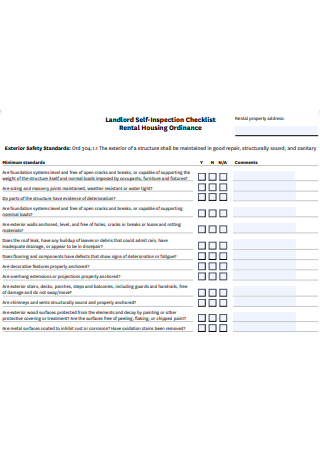
Landlord Self Inspection Checklist
download now -
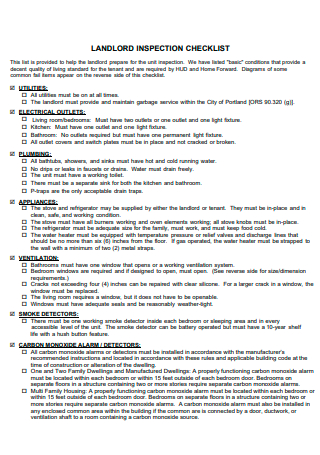
Landlord Inspection Checklist in PDF
download now
FREE Landlord Inspection Checklist s to Download
7+ Sample Landlord Inspection Checklist
What Is a Landlord Inspection Checklist?
Why Is a Landlord Inspection Checklist Important?
5 Types of Landlord Inspections:
What Do Landlords Check When Inspecting?
How To Prepare for Landlord Inspection:
FAQs
Can landlords inspect during covid-19?
How often should a landlord check properly?
Can I be present during a landlord inspection?
Can a landlord enter the property without notice?
What happens when you do not have a lease?
What are my rights as a tenant?
What Is a Landlord Inspection Checklist?
A landlord inspection should be a routine part of any property maintenance schedule to protect the landlord, the tenants, and the property. Keeping an eye on the property and using landlord inspection checklist helps keep track of its condition to avoid surprise expenses and maintain a comfortable rental for the tenants.
These detailed walk-throughs allow an owner to take note of a property’s condition, including repairs, wear and tear, and even the cleanliness of the unit. This helps prevent surprise expenses and maintains the property’s condition.
Most landlords inspect their property before and after the renter moves in at least to update their rent roll sheet. Of course, if the tenants are living in the property for an extended period of time, it’s also a better idea to complete a walk-through at least once a year to make any necessary repairs and possible pet damage.
Why Is a Landlord Inspection Checklist Important?
Landlord inspection checklist is not a test to see how tidy a property is. They are designed to recognize any problems that could require maintenance or repair and to make sure the place is being looked after. This checklist allows to rate the condition of everything at the property and take detailed notes. Both you and your tenants should sign and date the inspection report to indicate mutual agreement about the condition of the property.
Landlord inspections are a great way to plan for your property upgrades—especially if you manage a lot of properties. Regular inspections allow you to identify when an appliance may need service or if it’s time to repair the roof before it’s too late so you can properly budget for maintenance. Furthermore, landlord inspections also allow you to ensure your tenants are caring for the property. Documenting the state of your property helps you identify damage caused by the tenant that they’re ultimately responsible for replacing. These inspections are just as beneficial for the tenant to identify concerns or repairs for you to address to ensure the property is comfortably livable. Eventually, inspections protect both party’s investments and best interests.
5 Types of Landlord Inspections:
If you manage the rental properties, you should be prepared to conduct 5 types of inspections. These include routine inspections and those related to the beginning and end of a lease term.
What Do Landlords Check When Inspecting?
Every landlord inspection checklist will differ depending on who the landlord is, what type of rental property they have, and what responsibilities they have for maintaining the property.
There are general things a landlord walkthrough checklist can account for:
- Furnace filters
- Bugs/pests
- Smoke batteries
- Running toilets
- Fire extinguishers
- Water leaks (sink, toilet, faucet, roof)
- Water damage (walls, ceiling, floor)
- Window/door seals
- Any appliances
- Overall cleanliness/condition of property
Generally, before a landlord can enter an occupied property to perform a rental inspection, they need to make sure there’s been a proper communication beforehand with the tenants in compliance with the state’s notice to enter the property.
How To Prepare for Landlord Inspection:
Chances are, a person is faced with fairly regular property inspections by either their landlord or property manager if they are renting a property. These inspections can sometimes be a hassle, but there are steps to take in order to minimize the stress and make sure the landlord inspection goes smoothly:
Step 1: Let the Property Manager Know If You Are Unable to Attend the Inspection
The property manager will do their best to visit at a time that will suit you, but in the event you that can’t attend, it is best to let the property manager know early so alternative arrangements can be made—such as agreeing to have the property inspected while you are away or at a more convenient time.
Step 2: Ensure the Home Is Clean
Usual wear and tear are predictable during a routine inspection, and is mainly out of your control, but keeping the home nice and clean will ensure a positive property report. It will make it easier to properly inspect the home and will show your property manager that you are respecting the property. With that being said, no one expects the home to look like a display house, and your property manager does understand this is your home.
Step 3: Report Any Maintenance Issues or Accidental Damage
Reporting maintenance issues as soon as they occur will help your property manager or landlord attend to them the soonest. Also, any accidental damage should be reported early on so it can be fixed, especially if it causes health and safety issues. If the damage is something that you will need to fix, your property manager will issue you with a Notice to Remedy, usually giving you until the next inspection to complete.
Step 4: Take the Opportunity to Bring Up Requests or General Concerns
If you are unable to attend the inspection, take the time to send your property manager a quick email or message of what you would like to discuss. If you wanted to talk about the possibility of a pet for instance, or the addition of an air conditioner, let the property manager know so they can bring this up with the landlord when reporting back.
In the end, the property manager understands that this is where you live, and doesn’t expect perfection. Having a good rapport with your property manager or landlord will go a long way to having a happy tenancy and will make sure they act as an advocate on your behalf as well. Keep the lines of communication open, try to be understanding of the role they play, and be honest in dealings with them.
FAQs
Can landlords inspect during covid-19?
Landlords and tenants should discuss and agree on whether in-person inspections are essential. In-person inspections of rental properties can take place with the tenant’s consent, as long as public health measures are followed, like physical distancing, record keeping, and mask wearing requirements.
How often should a landlord check properly?
It is wise for landlords to conduct a property inspection every quarter. If you have carried out recurrent positive inspections from the same tenants, then you could lessen this to every six months only.
Can I be present during a landlord inspection?
Yes. Be as casual and relaxed about it as you can. There is no reason for you to be worried as well as it is just a mandatory walk through. The landlord should give you more than the needed 24-hour notice prior the inspection. This gives you time to present the rental place in a nice and clean state.
Can a landlord enter the property without notice?
A landlord can enter the property in an emergency without notice or permission. In addition, they may own the property, but that doesn’t give him or her full authority to come and go in your place at will. For instance, if a burst pipe in your apartment is leaking into the unit downstairs, your landlord may enter or send someone from the maintenance crew to enter your home if you’re not there. Even if your landlord gives you notice, he or she must have a good reason to enter the property. In most cases, your landlord can enter your home in an emergency, to make repair, to show the property to prospective tenants if you’re ending your lease, and to inspect for safety issues.
What happens when you do not have a lease?
If you don’t have a written lease, that doesn’t mean your rights go out the window. For leases that last less than a year, oral leases are considered acceptable.6 In many cases, paying a security deposit and paying rent on a timely basis each month is enough to prove that you have an oral agreement. It’s always smart to make sure you get a signed contract when entering into any rental agreement. The contract should spell out the exact terms of the lease, including landlord’s right to entry. Before signing any lease, make sure the entry provisions are in accordance with state laws. If you’ve already signed a lease and it doesn’t mention privacy laws, look up the laws in your state and request a revised lease agreement from your landlord. This will help protect your rights to privacy and clarify any issues that may arise.
What are my rights as a tenant?
Most leases will have an entry provision that details when the landlord can enter the property. But just because something is stated in the lease, it does not mean it is legally binding. Even though a lease is a legal document, the conditions stated in it still have to obey the law. If your lease does not have an entry provision or mention anything about when the landlord can enter, your state’s privacy laws still apply. In addition, if you think your rights have been violated, a court will denote to your implied right to quiet enjoyment—a concept of common law that “refers to the right of an occupant of real property, particularly of a residence, to enjoy and use premises in peace and without interference”. Even if it is not in your lease or rental agreement, a court will still recognize this right. Furthermore, part of this agreement protects your privacy as outlined in your state’s laws. For instance, in some places or nation, the law states that a landlord must provide written notice before entering your property. If they do not, they are in violation of your lease—oral or written.
A harmonious landlord-tenant relationship encompasses cooperation and communication, and this especially applies to handling a rental property inspection. Oftentimes, it is best to know on when to perform one, how to do so while protecting tenant privacy, and the dos and don’ts you should know when performing a property inspection.
Conducting property inspections is an important part of your job as a landlord. Routine inspections can help prevent big problems down the road even if you have a great tenant. Inspections also indicate to a tenant the type of condition you expect the property to be returned in. Because after all, if you do not care about the property, why should they, right?
